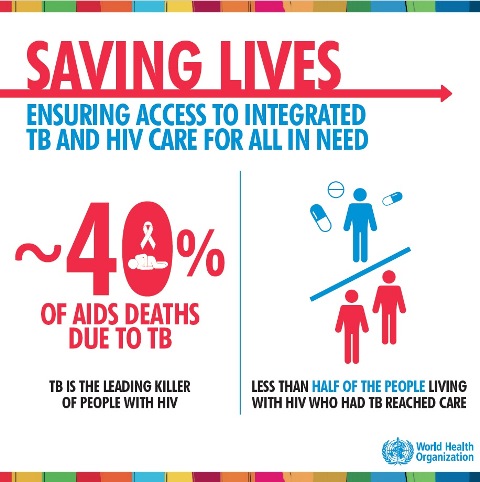
World AIDS Day serves as a beacon of hope, and a day to celebrate the progress in the fight against the AIDS epidemic which once threatened to overwhelm whole communities. While more people than ever before are now on treatment, with millions of lives saved each year – around one million people died from HIV-related causes globally in 2016. Tuberculosis (TB) is the leading killer of people with HIV, accounting for around 40% of AIDS-related deaths. Both diseases together form a lethal combination, each speeding the other's progress.
The good news is that there has been progress in jointly addressing the TB and HIV epidemics. The WHO-recommended policy on collaborative TB-HIV activities, including actions for prevention and treatment of infection and disease, have succeeded in saving more than 6 million lives between 2005 and 2016. HIV testing among people with TB has increased, especially in the African region that has the highest TB/HIV burden, where 82% of TB patients knew their HIV status. Globally, 85% of reported HIV-positive TB patients in 2016 were started on antiretroviral therapy.
However, gaps remain and many are left behind in access to care. In 2016, only 39% of the total number of people living with HIV estimated to have developed TB had been placed on antiretroviral therapy in 2016 and about 54% of the estimated 1 million HIV-positive TB cases did not reach care. In addition, TB preventive treatment which can prevent TB disease and deaths among people living with HIV is not accessible to all in need, only 42% of those newly enrolled in HIV care received it in 2016.
Achieving universal health coverage will close these gaps and eliminate preventable deaths due to TB among people with HIV. This is why the WHO focus for World AIDS Day this year -"Everybody counts" is critical in line with the global World AIDS Day 2017 campaign which promotes the theme "Right to health". Ending both HIV and TB as targeted in the Sustainable Development Goals can only be achieved if the right to health is placed at the centre of the responses to both these epidemics, ensuring no one is left behind especially those most at risk, and facing discrimination and marginalization.
This has been prominently put forward in the “Moscow Declaration to End TB” which was adopted by 120 country delegations including 75 Ministers at the first WHO Global Ministerial Conference on Ending TB, on 16-17 November. The declaration puts a strong emphasis on a rights-based response to end TB, as well as on stepping up the HIV/TB response through integrated care for all people affected by TB and HIV to reach the global target of driving down TB-related deaths among people living with HIV by 75% by 2020. These commitments will be taken up to the level of Heads-of-State in 2018 at the first-ever UN General Assembly High Level Meeting on TB.
With the political spotlight on the fight to end both epidemics, there is reason for renewed hope this year. Let us recommit today to act on the promises we have made - to ensure no one is left behind, to protect the right to health for all and to continue to mobilize the political and social commitment needed to end the deaths and suffering caused by both epidemics.
